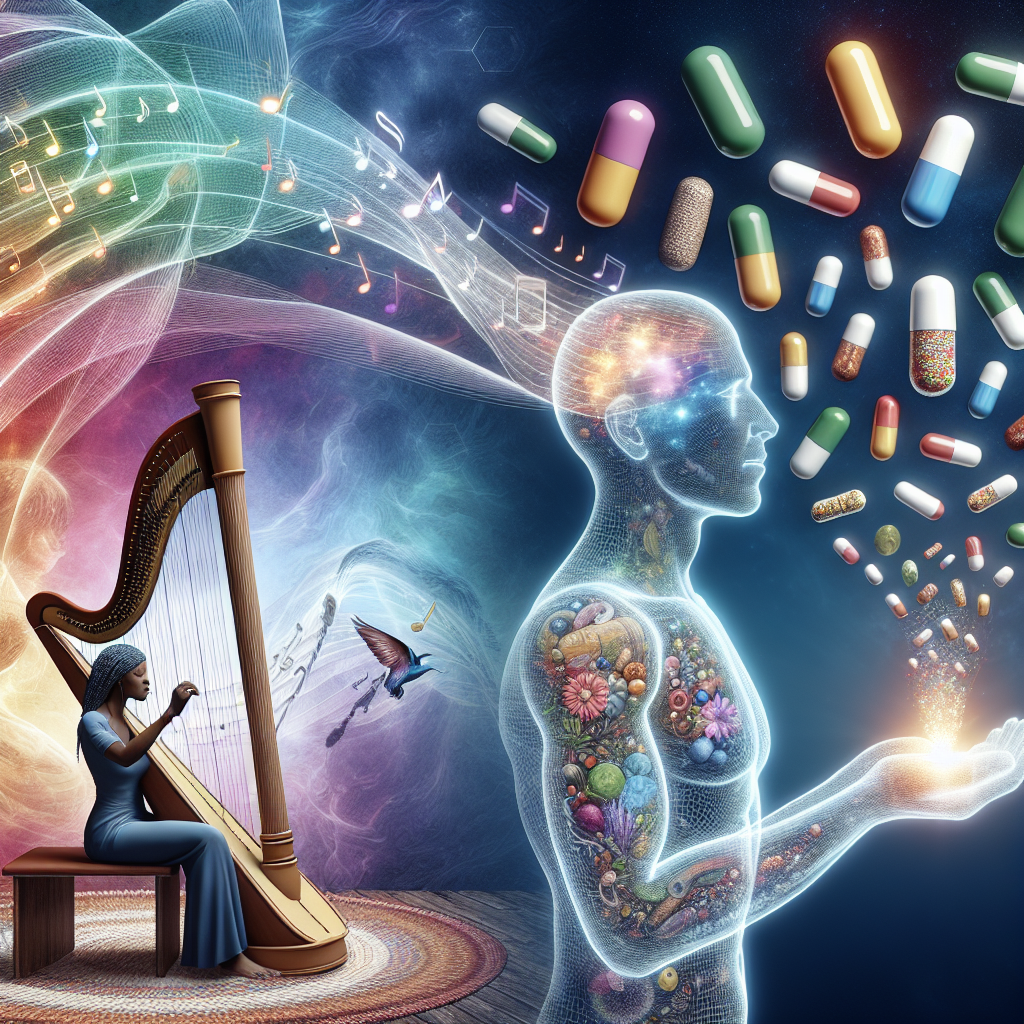How Music Therapy and Vitamins Work Together for Healing

Discover how music therapy and vitamins work together for healing. Uncover the power of this unique combination and how it can enhance your overall well-being. Visit My Vibrant Vitality to learn more.
The Synergistic Effects of Music Therapy and Vitamins on Healing
Music therapy and vitamins, two seemingly disparate elements, have been found to work in harmony to promote healing. This unique combination of sound and nutrition has been shown to have a synergistic effect on the body, enhancing both physical and mental well-being.
Music therapy, a form of expressive arts therapy, involves the use of music to address physical, emotional, cognitive, and social needs of individuals. It can involve listening to music, creating music, or moving to music. The therapeutic benefits of music are well-documented. It has been shown to reduce stress, alleviate pain, enhance memory, improve communication, and promote physical rehabilitation.
On the other hand, vitamins are essential nutrients that our bodies need in small amounts to work properly. They play a crucial role in maintaining good health and wellbeing. Vitamins are involved in numerous biological processes, including cell growth and division, maintaining a healthy immune system, and converting food into energy.
When combined, music therapy and vitamins can have a profound impact on healing. The soothing effects of music can help to reduce stress and anxiety, which in turn can enhance the body’s ability to absorb and utilize vitamins. Stress has been shown to deplete certain vitamins, such as vitamin C and the B vitamins, which are essential for immune function and energy production. By reducing stress, music therapy can help to ensure that these vitamins are available for the body to use.
Moreover, music therapy can also stimulate the release of endorphins, the body’s natural painkillers. This can help to reduce pain and inflammation, which can interfere with the absorption of vitamins. By reducing pain and inflammation, music therapy can enhance the body’s ability to absorb and utilize vitamins, further promoting healing.
Vitamins, in turn, can enhance the benefits of music therapy. Certain vitamins, such as the B vitamins, are essential for brain health and function. They are involved in the production of neurotransmitters, which are chemicals that transmit signals in the brain. By ensuring optimal brain health, these vitamins can enhance the cognitive and emotional benefits of music therapy.
For instance, music therapy has been shown to improve memory in individuals with Alzheimer’s disease. This may be enhanced by vitamins such as vitamin B12, which is essential for brain health and memory. Similarly, music therapy has been shown to improve mood in individuals with depression. This may be enhanced by vitamins such as vitamin D, which is involved in the production of serotonin, a neurotransmitter that regulates mood.
In conclusion, music therapy and vitamins can work together to promote healing. The soothing effects of music can enhance the body’s ability to absorb and utilize vitamins, while vitamins can enhance the cognitive and emotional benefits of music therapy. This synergistic effect can enhance both physical and mental well-being, promoting overall health and healing. Therefore, incorporating both music therapy and vitamins into a holistic approach to health and wellness can be highly beneficial.
Exploring the Connection between Music Therapy and Vitamin Intake for Enhanced Recovery

Music therapy and vitamin intake may seem like two disparate elements, but they are increasingly being recognized for their combined potential in promoting healing and recovery. This article explores the intriguing connection between these two seemingly unrelated fields and how they can work together to enhance recovery.
Music therapy, a burgeoning field in healthcare, uses music interventions to address physical, emotional, cognitive, and social needs of individuals. It is a non-invasive and enjoyable method that has been found to reduce stress, alleviate pain, enhance memory, and improve communication. On the other hand, vitamins, essential nutrients that our bodies need for proper functioning, play a crucial role in maintaining health and aiding recovery. They boost the immune system, support growth and development, and help organs function properly.
The connection between music therapy and vitamin intake lies in their shared goal of promoting overall well-being and aiding recovery. Both music therapy and vitamins work to strengthen the body’s natural defenses and enhance its capacity to heal. They complement each other in a way that can significantly improve the recovery process.
Music therapy can stimulate the production of certain chemicals in the brain that promote healing and well-being. For instance, it can trigger the release of endorphins, the body’s natural painkillers, and serotonin, a hormone that contributes to happiness and well-being. This can help to create a positive mindset that is conducive to healing. Moreover, music therapy can also reduce stress and anxiety, which are known to impede the body’s healing process.
Meanwhile, vitamins, particularly those with antioxidant properties like vitamins C and E, can help to repair damage in the body and boost the immune system. They can also promote the production of collagen, a protein that aids in wound healing. Furthermore, certain vitamins like B vitamins are known to support brain health and cognitive function, which can be beneficial in music therapy as it often involves cognitive stimulation.
When music therapy and vitamin intake are combined, they can create a synergistic effect that enhances the healing process. The stress-reducing and mood-enhancing effects of music therapy can help to create an optimal environment for the body to heal, while vitamins provide the necessary nutrients to support this healing process. This combination can result in a more effective and efficient recovery.
Moreover, both music therapy and vitamin intake are easily accessible and can be incorporated into daily routines. They are non-invasive and generally have few side effects, making them suitable for individuals of all ages and health conditions.
In conclusion, the connection between music therapy and vitamin intake is a fascinating area of study that holds great potential for enhancing recovery. By understanding and harnessing this connection, we can create more holistic and effective approaches to healing. Whether you’re recovering from an illness or injury, or simply looking to boost your overall well-being, consider incorporating both music therapy and vitamins into your routine. The harmonious blend of these two elements may just be the key to a faster and more enjoyable recovery.
The Role of Music Therapy and Vitamins in Holistic Healing Approaches
Music therapy and vitamins, two seemingly disparate elements, have been found to work in harmony to promote healing and overall wellness. This unique combination is gaining traction in the realm of holistic healing, a field that emphasizes the treatment of the whole person, including physical, emotional, mental, and spiritual aspects.
Music therapy, a well-established health profession, uses music to address physical, emotional, cognitive, and social needs of individuals. It involves a range of activities, from listening to and creating music to discussing music and lyrics. The therapeutic benefits of music are vast. It can reduce stress, alleviate pain, express feelings, enhance memory, and improve communication.
On the other hand, vitamins are organic compounds that our bodies need in small quantities for normal growth and metabolism. They play a crucial role in bodily functions such as immunity, digestion, and metabolism. Certain vitamins, like B-complex vitamins and vitamin C, are known for their role in maintaining neurological health and reducing stress and anxiety.
When music therapy and vitamins are combined, they can create a powerful tool for healing. Music therapy can stimulate the release of endorphins, the body’s natural ‘feel-good’ hormones, which can reduce pain and induce feelings of pleasure or euphoria. This can be particularly beneficial for those dealing with chronic pain or mental health issues like depression or anxiety.
Meanwhile, vitamins can support this process by nourishing the body and ensuring it has the necessary resources to respond to the therapy. For instance, B vitamins are essential for the production of serotonin, a neurotransmitter that contributes to feelings of well-being and happiness. Therefore, a diet rich in these vitamins can enhance the mood-boosting effects of music therapy.
Moreover, music therapy can also help to stimulate appetite and improve digestion, which can enhance the absorption of vitamins and other nutrients. This is particularly beneficial for individuals who may have reduced appetite or digestive issues due to illness or medication side effects.
The combination of music therapy and vitamins also has potential benefits for cognitive health. Music has been found to stimulate parts of the brain involved in memory, attention, and even motor function. Vitamins, particularly B vitamins and antioxidants like vitamin C and E, have been shown to support cognitive health and may protect against cognitive decline.
In conclusion, the integration of music therapy and vitamins in a holistic healing approach can offer a multitude of benefits. This combination can provide a natural, non-invasive, and enjoyable way to enhance physical and mental health. It can help to reduce stress, improve mood, support cognitive function, and even enhance the body’s ability to heal itself.
While this approach may not replace conventional medical treatments, it can certainly complement them and may even enhance their effectiveness. As with any health intervention, it’s important to consult with a healthcare professional before starting any new therapy or supplement regimen. But with the right guidance, music therapy and vitamins can be a harmonious duo in the journey towards holistic healing.